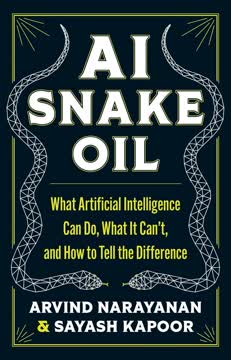Key Takeaways
1. Whistleblowing is a "Choiceless Choice" Driven by Conscience
For whistleblowers, the decision to blow the whistle is a choice about the sort of person they are and the one they want to be.
Acting on principle. Whistleblowers often describe their decision not as a calculated choice, but as a moral imperative they felt compelled to follow. It stems from a deep-seated sense of personal responsibility and a need to align their actions with their core values, even when it means defying authority or risking their careers. This internal drive is often more powerful than external pressures.
Internal conflict. The struggle is less about external consequences and more about the internal cost of remaining silent. As the author reflects on his own medical school experiences, he realizes his failure wasn't a lack of moral perception, but a failure to imagine the possibility of resistance. Whistleblowers reach a point where the thought of not speaking out becomes unbearable, a betrayal of the self they aspire to be.
Beyond heroism. This compulsion isn't necessarily about being a hero; it's about maintaining self-respect. As Peter Buxtun said of exposing the Tuskegee study, "Because it shouldn't be happening. Because it's happened elsewhere. This is Nazi medicine." It's a fundamental rejection of complicity in wrongdoing, a feeling that one "just had to do it" to be able to look at oneself in the mirror.
2. Institutions Fiercely Resist Accountability and Punish Dissenters
The main barrier was the sheer intransigence of the university.
Stonewalling and denial. When faced with allegations of wrongdoing, institutions typically respond with denial, deflection, and obstruction rather than investigation and accountability. The University of Minnesota's response to the Dan Markingson case involved years of refusing to engage with criticism, denying wrongdoing, and using legal tactics to delay or refuse access to information. This pattern is common across different organizations.
Retaliation is standard. Whistleblowers are almost universally met with hostility and punishment, regardless of the validity of their claims.
- Studies show over 80% of corporate whistleblowers are fired, quit under duress, or punished.
- Nurses reporting misconduct face formal reprimands and informal retaliation like ostracism.
- Even tenured academics can face marginalization, grant failures, and dismissal, as John Pesando experienced at the Fred Hutchinson Cancer Research Center.
Protecting the image. The primary concern of the institution becomes managing the public relations crisis and protecting its reputation, often at the expense of addressing the underlying issues or supporting those who raised concerns. The message is clear: loyalty to the institution trumps honesty and accountability.
3. The Ethic of Honor and Shame Underpins Whistleblower Motivation
What torments whistleblowers is what their decision will reveal about them. They are worried about the state of their soul.
Self-respect is paramount. Whistleblowing is deeply intertwined with a sense of personal honor and the fear of shame. It's not just about doing the right thing for others, but about maintaining one's own integrity and self-respect in the eyes of oneself and one's "honor world" (the community whose respect matters). Failing to speak out feels like a personal failure, a violation of one's own moral code.
Feeling complicit. Whistleblowers often feel a sense of shame or contamination from their association with the wrongdoing, even if they weren't directly involved. As one whistleblower told Fred Alford, "I’m ashamed of what my company did, and I’m ashamed I had to blow the whistle... Because I was part of that world." This isn't irrational guilt, but a reflection of identifying with the group whose actions are shameful.
Beyond altruism. While compassion for victims is often a factor, the driving force is frequently the internal demand of honor. As Martha Stephens said of exposing the Cincinnati radiation experiments, "I would have felt real bad not to have wanted to blow the whistle on them." This internal standard compels action even when external rewards are absent and risks are high.
4. Institutional Culture Enables Abuse and Silences Critics
You go in there humbly to kind of get it, to just kind of get with the program. You get with the program because that’s what you’re being hired to do.
Bureaucratic norms. Large institutions, especially academic medical centers, operate under bureaucratic norms that prioritize hierarchy, conformity, and discretion over independent moral judgment. As sociologist Robert Jackall found, "What’s right in the corporation is what the guy above you wants from you." This environment trains individuals to subordinate their personal ethics to the demands of the organizational structure.
Blindness to abuse. The very structure and culture of total institutions (like Willowbrook or prisons) or hierarchical medical centers can normalize abusive practices, making them invisible to those within the system. Doctors and staff may become desensitized or rationalize mistreatment as simply "the way things are done," especially when dealing with vulnerable populations. Mike Wilkins and Bill Bronston were shocked by Willowbrook because they didn't fully conform to the medical culture that saw patients as "material."
Fear of disruption. Questioning the status quo is seen as disruptive and disloyal. Those who speak out are not viewed as principled dissidents but as troublemakers who threaten the group's cohesion and the established order. This fear of being ostracized or labeled a "non-team player" (as John Pesando was told) is a powerful deterrent to dissent.
5. Solidarity is Crucial for Survival in the Face of Retaliation
The magic word for whistleblowers is solidarity.
Fighting alone is perilous. Whistleblowing is an intensely lonely experience, and fighting a powerful institution without allies is psychologically and professionally devastating. The isolation can lead to paranoia, despair, and a loss of perspective, plunging the whistleblower deeper into the "hole."
Strength in numbers. A group of whistleblowers standing together is much harder for an institution to discredit or silence than a single individual. The four whistleblowers at the Karolinska Institute consciously decided to work as a team, sharing information, strategizing together, and providing mutual support. This collective effort was critical to their eventual, albeit partial, success.
Psychological support. Beyond strategic advantage, solidarity provides essential psychological protection. Having friends or colleagues who believe you and support your cause helps counter the institution's efforts to isolate and demoralize you. As the author notes of his own struggle, "Without him [Leigh Turner], I’m not sure I would have survived."
6. Public Vindication Rarely Heals the Deep Wounds of the Struggle
What I had failed to understand was that public vindication is not the same as getting out of the hole.
Incomplete justice. Even when whistleblowers achieve some form of public validation, such as external investigations confirming their claims or media exposure, it often feels hollow and insufficient. The University of Minnesota's partial vindication of the Markingson case critics did not lead to apologies, accountability for individuals, or a sense of closure for the whistleblowers.
Lasting scars. The ordeal of whistleblowing leaves deep psychological wounds that public recognition cannot easily heal. Whistleblowers often struggle with:
- Demoralization and cynicism
- Distrust and paranoia
- Difficulty reconnecting with their former lives or careers
- A lingering sense of isolation and betrayal
Ambiguous endings. Unlike the clear triumph depicted in Hollywood narratives, real-life whistleblower stories often lack a definitive ending. The fight may drag on for years, and even when it concludes, the outcome is often contested or feels incomplete, making it difficult for the whistleblower to move on. As Ron Jones said of the "unfortunate experiment," "It will be with me to the grave."
7. Justice for Victims is Elusive, While Perpetrators Often Go Unpunished
Rarely do mistreated research subjects or their families get any real justice.
Lack of accountability. A disturbing pattern across research scandals is the failure to hold responsible individuals accountable for their actions. Researchers involved in studies that harmed or killed patients often face no sanctions, retain their positions, and may even receive honors and awards, as seen with figures like Saul Krugman, Albert Kligman, and Eugene Saenger.
Victims forgotten. The focus often shifts away from the harm done to the research subjects. Victims and their families may receive little to no compensation, struggle to get an apology, and find their experiences minimized or denied by the institutions responsible. The hidden plaque for the Cincinnati radiation victims is a stark symbol of this erasure.
Systemic failure. The oversight system itself (IRBs, OHRP, FDA) often fails to protect subjects or hold institutions accountable. As the OPRR's exoneration of the Fred Hutchinson Cancer Research Center demonstrated, regulatory bodies can be ineffective or unwilling to challenge powerful institutions, leaving whistleblowers and victims with few avenues for redress.
8. The "Hidden Curriculum" Undermines Formal Ethics Training
A central aim of medical training is to change your sensibility, to transform you into a different person, one who doesn’t react to death and illness like a civilian anymore.
Desensitization and conformity. Medical training and institutional culture can subtly erode individuals' natural moral responses to suffering and injustice. The "hidden curriculum" teaches that conformity, hierarchy, and institutional interests are paramount, often overriding the formal ethical principles taught in classrooms. This can make it difficult for individuals to recognize or act upon wrongdoing.
Prioritizing the institution. The system implicitly rewards loyalty and silence over dissent. As John Pesando observed of academic medicine, "The behavior required to survive in academic medicine is predatory." This environment fosters a culture where career advancement and institutional protection take precedence over patient welfare or ethical conduct, creating a powerful disincentive to speak out.
Moral compromise. Individuals may make small moral concessions to fit in or advance, gradually becoming desensitized to practices they might have found objectionable as outsiders. This process makes them less likely to challenge the system when serious abuses occur, as they have already internalized its norms and priorities.
9. The Struggle Changes the Whistleblower, Leading to Cynicism and Resilience
Your illusions of justice in the world are shaken.
Loss of innocence. The experience of whistleblowing often shatters idealistic worldviews, leading to profound disillusionment and cynicism about institutions and human nature. Whistleblowers may become distrustful, isolated, and struggle with the emotional toll of the battle.
Unexpected strength. Despite the negative consequences, the ordeal can also forge a deep sense of personal strength and moral clarity. Having faced intense pressure and remained true to their principles, whistleblowers may gain an unshakeable sense of self-respect and integrity that cannot be taken away, regardless of external outcomes. As Kalle Grinnemo said, "I have survived, and I know what I’ve done, and I have done it for the right reason. So, it makes me feel strong."
Redefined values. The experience often leads to a re-evaluation of what truly matters. External markers of success like career advancement or status may lose their appeal, while personal integrity, the respect of a few trusted allies, and the knowledge of having acted honorably become paramount. This internal validation becomes the primary measure of success in a world that often fails to provide external justice.
Last updated:
Review Summary
The Occasional Human Sacrifice explores medical whistleblowing through case studies and personal reflections. Readers appreciate Elliott's insightful analysis of whistleblowers' motivations and the consequences they face. The book's focus on both historical and recent unethical medical experiments is praised for its depth and accessibility. While some found the personal anecdotes and philosophical tangents excessive, most reviewers commend the book's thought-provoking examination of medical ethics, institutional power, and the psychological toll of exposing wrongdoing. Overall, it's considered an important, if sometimes disturbing, read for those interested in medical ethics and whistleblowing.
Similar Books




Download PDF
Download EPUB
.epub digital book format is ideal for reading ebooks on phones, tablets, and e-readers.




